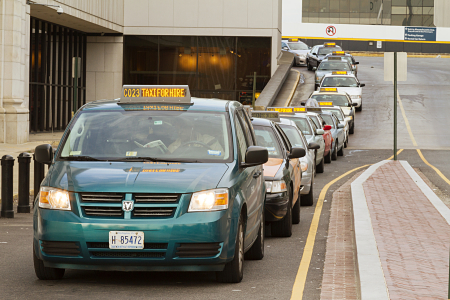Washington D.C.’s Taxi Commission is now the Department of For-Hire Vehicles (DFHV) and part of the reorganization requires the chairman be approved by the city council.

Taxi cab drivers, already being decimated by the growth of Uber and Lyft, are none too pleased to see “taxicabs” removed from the organization name.
“Taxicabs are being removed from the lingo, from the official record,” said Larry Frankel, chairman of the Dominion of Cab Drivers, a business association for the city’s cabbies. “After over 180 years of history — of taxicabs being an iconic part of Washington, D.C. — that we are stricken from the record is horrible.”
Critics say the new department will not properly regulate for-hire vehicles. Taxis are subject to strict rules — rates, paint schemes and dome lights, among many items, that are scrutinized by public officials.
Royale Simms, an attorney for the Teamsters Union that represents more than 2,000 taxi drivers, pointed out that DCTC issued 200 tickets to private vehicles for hire between January and April. In the same period, D.C. taxis got 4,000 tickets from the commission.
The DFHV was born after the taxicab commission was criticized for resisting change, including an unwillingness to abandon the zone system and hostility to ride-hailing.
“The members of the Commission — although they do their best — generally do not have enough significant policy, legal, transportation, or economics experience to make sophisticated judgments about proposed regulations,” according to a February report from the Committee on Transportation and the Environment, chaired by D.C. Council member Mary M. Cheh.
Cheh, who sponsored the legislation that organized the DFHV, said a streamlined agency would better serve the public.
“The commission is simply an outmoded mechanism for dealing with our modern for-hire transportation system,” said Cheh. “The agency model doesn’t change the regulatory powers, but provides clean lines of authority, greater efficiency, and makes the decisions about the industry more visible to the public.”
“The responsibilities of the renamed agency will remain fundamentally unchanged,” said Neville Waters, a spokesman for the DFHV. The commission’s current chairman, Ernest Chrappah, will be re-designated as the director of the new agency.
Legislation passed by the D.C. Council in May not only creates a regulatory agency. The legislation included the creation of an 11-member “advisory council” that will include nine community members: two drivers, two taxicab company representatives, two tourism industry officials and three District residents who “regularly use public or private vehicles-for-hire in the District.”
“It is time for us to reinvent ourselves,” said Chrappah. “Not only because the industry has evolved, but also there are tremendous opportunities on the horizon to make sure drivers have access to increased fare opportunities and consumers have choice.”
The new agency will not have the authority to regulate the business model of ride-hailing apps such as Uber and Lyft — but will retain the authority to enforce rules on individual drivers — for instance, an Uber or Lyft driver who picks up a street hail can be fined.
Since Uber rose to dominate the personal transport market in Washington, cabbies and companies alike have reported steep losses as their legacy industry has been slow to modernize. D.C. taxicabs still operate under restrictive regulations, use an array of different backseat payment systems that vary in quality, and a universal D.C. Taxi app has been slow to catch on.
In the meantime, Uber and its ride-hailing competitors continue to win the marketplace with their cashless, all-digital payment systems and lower fares.
“We want reform and a level playing field. We want this new agency to live up to its name and the only way for that to happen is for the Council to give it the power to regulate all for-hire vehicles,” Simms said.
